Biden, Netanyahu discuss weakening of Iran's regional power - White House
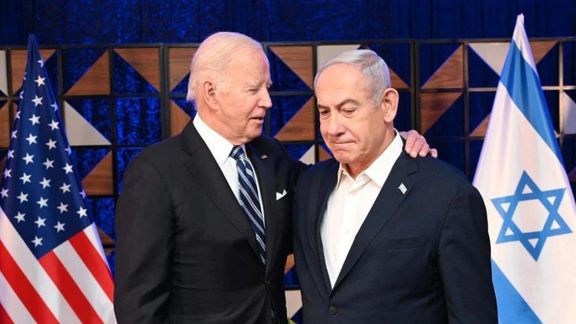

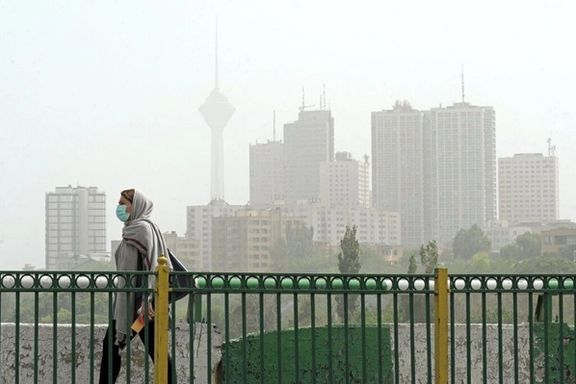
Air pollution in Iran claimed the lives of over 30,000 people and cost the country an estimated $12 billion in last Iranian year, according to the Ministry of Health.
Abbas Shahsavani, the head of the Air Health and Climate Change Group of the Ministry of Health, announced on Sunday that based on monitoring a statistical population of 48 million people, the number of deaths attributed to air pollution was 30,692 in the Iranian year 1402 (roughly March 2023-March 2024).
It represents a 17% increase (4,385 more deaths) compared to the previous year, when 26,307 deaths were recorded. Shahsavani noted that the year 1401 (March 2022-March 2023) also saw a significant 26% increase in air pollution-related fatalities compared to a year earlier.
The crisis is particularly acute in Tehran, where only 12 days – a mere 3% of the year – had safe levels of particulate matter less than 2.5 microns (PM2.5), a dangerous pollutant that can penetrate deep into the lungs and bloodstream.
Tehran's air pollution has persisted for 10 consecutive days, with Ahvaz, Mahshahr, and Abadan also experiencing "red zone" (very unhealthy) air quality on Sunday. Several other cities, including Zanjan, Ramhormoz, and Shadegan, reported unhealthy air for sensitive groups.
The worsening air quality has led to a 30% increase in visits to government medical centers for non-communicable respiratory diseases since late December.
Over the past week, hundreds of people across Iran have been hospitalized due to heart and respiratory problems, forcing school, university, and government office closures in some provinces.
While dust storms decreased in western regions last year, they intensified in eastern areas, particularly in Zabol and Iranshahr in Sistan-Baluchestan province, which Shahsavani identified as the country's most polluted cities.
The increase in sandstorms in Sistan-Baluchestan province is linked to the drying of key regional rivers and wetlands, including the Hirmand, Hamun, and Jazmourian.
Isfahan and Mashhad, two major metropolitan areas, are also experiencing high levels of pollutants.
As the cost mounts, the Ministry of Health has been tasked with investigating the health and economic impacts of air pollution since 1396 (March 2017-March 2018), aiming to advocate for effective measures to mitigate the problem.
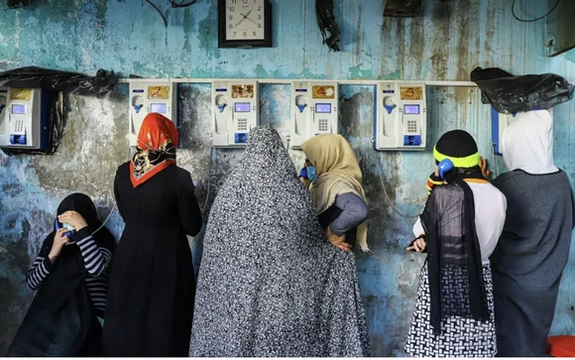
Farzaneh Bijanipour, a prisoner held in the notorious Qarchak Prison in southern Tehran, passed away on Saturday evening due to lack of medical care, a Norway-based human rights organization reported on Sunday.
According to the report by the Iran Human Rights Organization, Bijanipour visited the prison's infirmary in poor condition, but the doctor accused her of feigning illness and, after a subsequent visit, only prescribed a painkiller.
Later on Saturday evening, she became unconscious and passed away after being transferred to the infirmary, the IHR said. Prison authorities transferred her to the hospital once she was already dead.
Widespread violations of the right to healthcare have been reported in Iranian prisons over the past decades, with a number of prisoners losing their lives due to the neglect of prison authorities and deprivation of access to medical services.
Last year, UN human rights experts voiced deep concern over Iran's persistent refusal to grant "timely and adequate healthcare" to human rights defenders and other detainees.
They highlighted a troubling pattern of ill-treatment among Iranian detainees, marked by inadequate access to essential medical care, with a particular emphasis on the plight of human rights activist and Nobel Peace Prize laureate Narges Mohammadi.
“Our deep concerns about the physical and mental integrity of Narges Mohammadi have been communicated to the Iranian Government,” the experts said in a statement released on the UN website in August.
The experts emphasized that “the healthcare of prisoners, as well as the obligation not to expose any prisoner to ill-treatment, is the responsibility of the State,” reminding that the Islamic Republic of Iran is a party to the International Covenant on Economic, Social and Cultural Rights (ICESCR) and the International Covenant on Civil and Political Rights (ICCPR).
“Prisoners have the right to equivalent healthcare available in the community and must be given prompt access to medical attention in urgent cases,” the experts underscored.
Amnesty International has underscored the gravity of the situation, asserting that Iranian officials have effectively turned the nation’s prisons into "waiting rooms of death."
According to a 2022 report by Amnesty International, Iranian authorities are perpetrating alarming violations of the right to life by deliberately denying ailing prisoners access to lifesaving healthcare. This "deadly cruelty" involves both blocking or delaying emergency hospitalization and consistently denying adequate medical care throughout imprisonment. As a result, prisoners' health deteriorates, leading to unnecessary pain and suffering and, in some cases, preventable loss of life.
The rights group further highlighted that numerous cases of suspicious deaths in custody, potentially linked to the denial of medical care, have emerged in recent years, underscoring a troubling crisis of impunity for violations of the right to life.
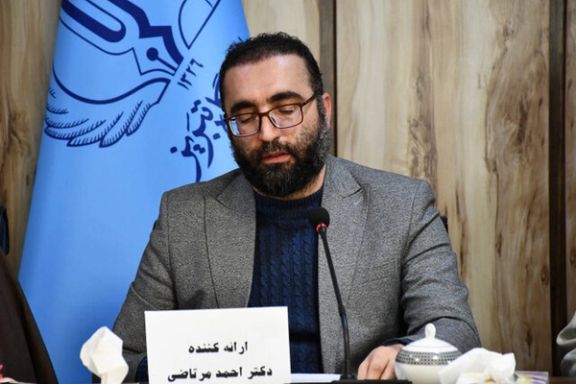
A member of Theology Faculty at Iran's University of Tabriz has raised concerns about sperm collection practices at some Iranian infertility clinics, citing religious objections to masturbation.
Ahmad Mortazi said on Sunday that "illegitimate methods, including masturbation, are used for sperm collection in some infertility centers, and this method is contrary to Sharia principles."
He did not mention any Sharia-compliant alternatives.
Referring to the establishment of sperm banks, Mortazi added that some Islamic jurists consider semen impure, which makes its trade not permissible.
Last week, Iran’s Ministry of Science called for the removal of educational content deemed to discourage childbearing as the country is intensifying efforts to combat declining fertility rates.
Government efforts to encourage higher birth rates in Iran have failed to produce results, according to data from the National Organization for Civil Registration.
Births declined by more than 17,000 in the Iranian year that began on March 21, 2023, compared to the previous year, with the average children per family down from six to three.
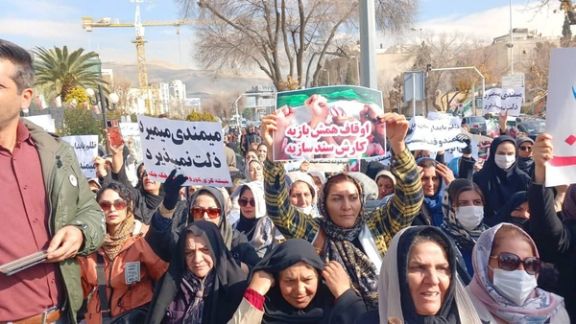
Police in a southern Iranian town used pepper spray to disperse a protest on Sunday against the seizure of lands by administrators of a major shrine, in the latest demonstration to be quelled by force.
Eyewitness videos obtained by Iran International show protesters being confronted by government forces, who used the pepper spray to disperse the crowd.
The dispute centers around claims by the administrators of the Shah Cheragh shrine that large portions of Meymand are part of a religious endowment, or "waqf," dating back to historical documents they allege validate their ownership.
However, the people of Meymand have strongly rejected the claims, insisting that the documents are fraudulent and that their land rights have been wrongfully taken.
Meymand, located about 70 miles from Shiraz, is home to over 10,000 people, many of whom rely on the manufacture and sale of rose water, a product sold across Iran.
The local community has expressed growing frustration over the years, accusing shrine administrators of obstructing the delivery of public services to the city.
Abbas Sharifi, a spokesperson for the Firuzabad County Council, explained, "Over the past decade, the administrators of the Shah Cheragh shrine have prevented local authorities from providing services to the people of Meymand through various correspondences with government departments."
The clash highlights broader tensions between local communities and religious authorities over land rights, with residents of Meymand feeling that their livelihoods and autonomy are being threatened.
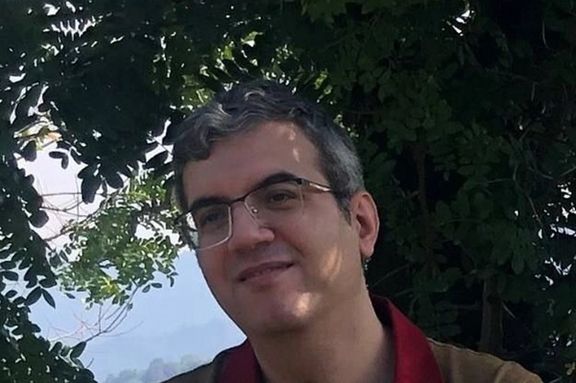
Italian authorities on Sunday released Mohammad Abedini Najafabadi, a 38-year-old Swiss-Iranian wanted on terrorism charges by the US, Iran's Judiciary said, a few days after the Islamic Republic released an Italian journalist detained in Tehran after Abedini's arrest in Milan.
Abedini arrived in Tehran on Sunday afternoon, the Iranian Judiciary's news website Mizan reported Sunday.
"Abedini was arrested over a misunderstanding, which was resolved through the efforts of Iran's Ministry of Foreign Affairs and negotiations between the relevant departments of Iran's Ministry of Intelligence and the Italian intelligence service," the report added.
"Abedini was released thanks to the efforts of Iran's diplomatic apparatus," said Foreign Ministry spokesman Esmail Baghaei.
Abedini, accused of transferring drone technology to Iran, was arrested at Milan Airport under a US warrant in December. Washington alleges that the technology was used in a February attack near the Jordan-Syria border, which killed three American soldiers—an accusation Iran denies.
His arrest has been linked to the detention of Italian reporter Cecilia Sala, who was seized in Tehran last month while working under a standard journalistic visa and released earlier this week.
Abedini's alleged release came after Italian Justice Minister Carlo Nordio filed a formal request with the Milan Court of Appeal to revoke his pre-trial detention.
In his intervention, Nordio invoked a specific provision of Italy’s Code of Criminal Procedure, which allows the Justice Minister to request or revoke precautionary measures during extradition proceedings.
Iran's consulate in Italy had requested Italian authorities to allow Abedini to leave detention facilities in return for guarantees that he would stay in a known location.
Milan's attorney general argued last week that Iranians' guarantees--including housing and financial assistance, potential travel restrictions and mandatory check-ins--would be insufficient to address the risk of flight for the individual sought by the United States for extradition.